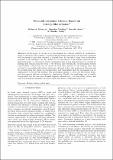Demand response scheme based on lottery-like rebates
Author(s)
Schwartz, Galina A.; Tembine, Hamidou; Amin, Saurabh; Sastry, S. Shankar
DownloadAmin_Demand response.pdf (215.2Kb)
OPEN_ACCESS_POLICY
Open Access Policy
Creative Commons Attribution-Noncommercial-Share Alike
Terms of use
Metadata
Show full item recordAbstract
In this paper, we develop a novel mechanism for reducing volatility of residential demand for electricity. We construct a reward-based (rebate) mechanism that provides consumers with incentives to shift their demand to off-peak time. In contrast to most other mechanisms proposed in the literature, the key feature of our mechanism is its modest requirements on user preferences, i.e., it does not require exact knowledge of user responsiveness to rewards for shifting their demand from the peak to the off-peak time. Specifically, our mechanism utilizes a probabilistic reward structure for users who shift their demand to the off-peak time, and is robust to incomplete information about user demand and/or risk preferences. We approach the problem from the public good perspective, and demonstrate that the mechanism can be implemented via lottery-like schemes. Our mechanism permits to reduce the distribution losses, and thus improve efficiency of electricity distribution. Finally, the mechanism can be readily incorporated into the emerging demand response schemes (e.g., the time-of-day pricing, and critical peak pricing schemes), and has security and privacy-preserving properties.
Date issued
2014-08Department
Massachusetts Institute of Technology. Department of Civil and Environmental EngineeringJournal
Proceedings of the 19th World Congress of the International Federation of Automatic Control (IFAC 2014)
Publisher
International Federation of Automatic Control
Citation
Schwartz, Galina A., Hamidou Tembine, Saurabh Amin, and S. Shankar Sastry. "Demand response scheme based on lottery-like rebates." 19th World Congress of the International Federation of Automatic Control (IFAC 2014) (August 2014).
Version: Author's final manuscript
ISBN
978-3-902823-62-5
ISSN
1474-6670